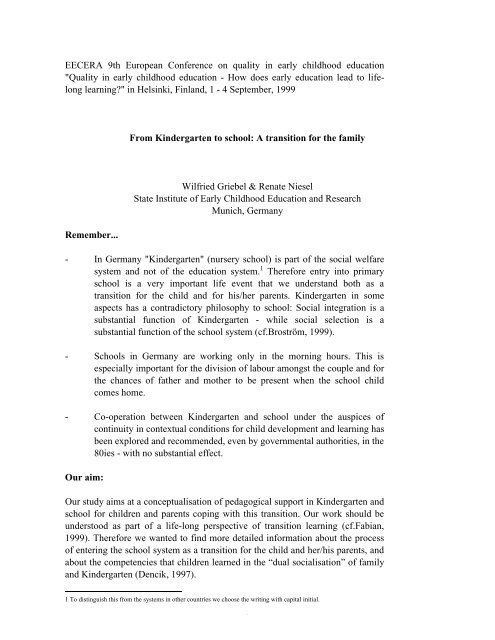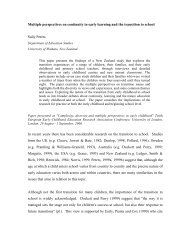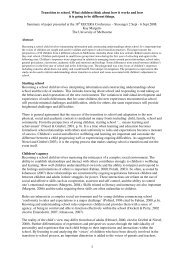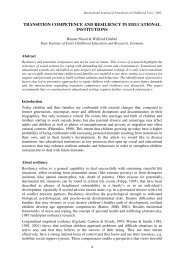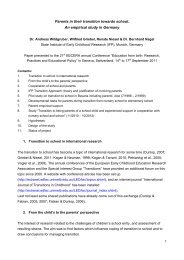From Kindergarten to school: A transition for the - Extranet
From Kindergarten to school: A transition for the - Extranet
From Kindergarten to school: A transition for the - Extranet
You also want an ePaper? Increase the reach of your titles
YUMPU automatically turns print PDFs into web optimized ePapers that Google loves.
EECERA 9th European Conference on quality in early childhood education<br />
"Quality in early childhood education - How does early education lead <strong>to</strong> lifelong<br />
learning?" in Helsinki, Finland, 1 - 4 September, 1999<br />
Remember...<br />
<strong>From</strong> <strong>Kindergarten</strong> <strong>to</strong> <strong>school</strong>: A <strong>transition</strong> <strong>for</strong> <strong>the</strong> family<br />
Wilfried Griebel & Renate Niesel<br />
State Institute of Early Childhood Education and Research<br />
Munich, Germany<br />
- In Germany "<strong>Kindergarten</strong>" (nursery <strong>school</strong>) is part of <strong>the</strong> social welfare<br />
system and not of <strong>the</strong> education system. 1 There<strong>for</strong>e entry in<strong>to</strong> primary<br />
<strong>school</strong> is a very important life event that we understand both as a<br />
<strong>transition</strong> <strong>for</strong> <strong>the</strong> child and <strong>for</strong> his/her parents. <strong>Kindergarten</strong> in some<br />
aspects has a contradic<strong>to</strong>ry philosophy <strong>to</strong> <strong>school</strong>: Social integration is a<br />
substantial function of <strong>Kindergarten</strong> - while social selection is a<br />
substantial function of <strong>the</strong> <strong>school</strong> system (cf.Broström, 1999).<br />
- Schools in Germany are working only in <strong>the</strong> morning hours. This is<br />
especially important <strong>for</strong> <strong>the</strong> division of labour amongst <strong>the</strong> couple and <strong>for</strong><br />
<strong>the</strong> chances of fa<strong>the</strong>r and mo<strong>the</strong>r <strong>to</strong> be present when <strong>the</strong> <strong>school</strong> child<br />
comes home.<br />
- Co-operation between <strong>Kindergarten</strong> and <strong>school</strong> under <strong>the</strong> auspices of<br />
continuity in contextual conditions <strong>for</strong> child development and learning has<br />
been explored and recommended, even by governmental authorities, in <strong>the</strong><br />
80ies - with no substantial effect.<br />
Our aim:<br />
Our study aims at a conceptualisation of pedagogical support in <strong>Kindergarten</strong> and<br />
<strong>school</strong> <strong>for</strong> children and parents coping with this <strong>transition</strong>. Our work should be<br />
unders<strong>to</strong>od as part of a life-long perspective of <strong>transition</strong> learning (cf.Fabian,<br />
1999). There<strong>for</strong>e we wanted <strong>to</strong> find more detailed in<strong>for</strong>mation about <strong>the</strong> process<br />
of entering <strong>the</strong> <strong>school</strong> system as a <strong>transition</strong> <strong>for</strong> <strong>the</strong> child and her/his parents, and<br />
about <strong>the</strong> competencies that children learned in <strong>the</strong> “dual socialisation” of family<br />
and <strong>Kindergarten</strong> (Dencik, 1997).<br />
1 To distinguish this from <strong>the</strong> systems in o<strong>the</strong>r countries we choose <strong>the</strong> writing with capital initial.<br />
1
Developing <strong>the</strong> <strong>the</strong>oretical background:<br />
There are several <strong>the</strong>oretical concepts <strong>to</strong> describe <strong>the</strong> child’s entry in<strong>to</strong> <strong>the</strong> <strong>school</strong><br />
system (cf. Fabian, 1998, 1999). In an eco-psychological perspective i.e. personprocess-context<br />
model of Bronfenbrenner (1979) one could describe <strong>the</strong><br />
interacting of a child in different social systems and interactions among <strong>the</strong>se<br />
systems. School is unders<strong>to</strong>od as a micro-system <strong>for</strong> <strong>the</strong> child with direct<br />
interactions. By connecting <strong>the</strong> <strong>school</strong> with <strong>the</strong> child’s family and indirect<br />
influences <strong>school</strong> is also a meso-system (Nickel, 1990; Petzold, 1992). Changes<br />
of interactions within and between systems occur over time, as a chrono-system<br />
(Bronfenbrenner, 1986). Societal norms and values work within a macro-system<br />
level, especially in respect <strong>to</strong> goals of socialisation and education (Tournai,<br />
1998).<br />
Fabian (1998, 1999) in her conceptual framework additionally integrates an<br />
anthropological approach of van Gennep (1960, 1999). She describes rites of<br />
passage <strong>for</strong> entering <strong>the</strong> <strong>school</strong> system and identifies preliminal stages, liminal<br />
stages and postliminal stages of a rite of passage. To give examples: Talking<br />
about "big" <strong>school</strong> and creating expectations, different treatment of <strong>the</strong> oldest<br />
children group within <strong>the</strong> kindergarten represent preliminal rites of passage. Preentry<br />
visits of <strong>school</strong> and buying <strong>the</strong> <strong>school</strong> uni<strong>for</strong>m also are considered as<br />
belonging <strong>to</strong> <strong>the</strong> preliminal stage (Fabian, 1998). Meeting <strong>the</strong> first teacher and<br />
separating from <strong>the</strong> parent(s) on <strong>the</strong> first day of <strong>school</strong> would be part of liminal<br />
rite of passage, and recognising and acknowledging <strong>the</strong> first day of <strong>school</strong> by<br />
presents, invitation end celebration could be regarded as parts of postliminal rite<br />
of passage of induction <strong>to</strong> <strong>school</strong>, followed by processes of habituation <strong>to</strong> <strong>the</strong> new<br />
status (Fabian, 1998).<br />
Instead of being unders<strong>to</strong>od in a perspective of crisis or stress <strong>for</strong> <strong>the</strong> child, we<br />
showed that a concept of family <strong>transition</strong> is suitable <strong>for</strong> enhancing <strong>the</strong> multiple<br />
demands and expectations concerning children and parents as well as on <strong>the</strong><br />
institution’s side (Griebel & Niesel, 1997; Cowan et al., 1994). Within a<br />
developmental perspective of adaptation <strong>to</strong> changes in life circumstances, Welzer<br />
(1993) defined <strong>transition</strong> as a "phase of intensified and accelerated developmental<br />
demands"; <strong>transition</strong>s being socially regulated. The family <strong>transition</strong> model of<br />
Cowan (1991) <strong>for</strong> family development was designed <strong>to</strong> study e.g. birth of first<br />
child, divorce, remarriage and includes <strong>the</strong> perspectives of all family members. In<br />
our society children and <strong>the</strong>ir families will have <strong>to</strong> cope with more and more<br />
discontinuities and <strong>transition</strong>s in <strong>the</strong>ir lives, so <strong>transition</strong> learning is of great<br />
interest <strong>to</strong> us (F<strong>the</strong>nakis, 1997).<br />
Transition in our study is unders<strong>to</strong>od as a process leading <strong>to</strong> changes in<br />
- Identity<br />
2
- Roles<br />
- Relations<br />
- Settings reps. commuting between different settings.<br />
Transition processes go along with strong emotions and stress.<br />
We found it important <strong>to</strong> include an aspect of Lazarus' advanced stress <strong>the</strong>ory: it<br />
makes a difference <strong>for</strong> <strong>the</strong> subject, if adaptation demands are appraised as a<br />
challenge or a threat (Lazarus & Folkman, 1987).<br />
Methods:<br />
We collected from July 1998 till March 1999<br />
- questionnaire in<strong>for</strong>mation on 162 first-born children (85 girls, 77 boys) in<br />
Bavaria from parents and from <strong>Kindergarten</strong> educa<strong>to</strong>rs,<br />
- interview data from 27 of <strong>the</strong>se children at (1) end of <strong>the</strong> last <strong>Kindergarten</strong><br />
year, (2) 3 months after entry in<strong>to</strong> <strong>school</strong>, (3) half a year after entry in<strong>to</strong><br />
<strong>school</strong> and getting<br />
- <strong>the</strong> first report by <strong>the</strong> <strong>school</strong> teacher, and<br />
- interview data from parents (1) 3 months and (2) 6 months after child’s<br />
<strong>school</strong> entry.<br />
2<br />
Questions referred <strong>to</strong> coping with entry in<strong>to</strong> <strong>Kindergarten</strong> (retrospective),<br />
preparation <strong>for</strong> <strong>school</strong> in <strong>Kindergarten</strong> and at home including "playing <strong>school</strong>",<br />
child competencies and coping strategies, ways of co-operation <strong>Kindergarten</strong><strong>school</strong>,<br />
expectations of parents, and additional <strong>transition</strong>s in <strong>the</strong> family biography.<br />
Selected results:<br />
Coping with entry in<strong>to</strong> <strong>Kindergarten</strong> - retrospective<br />
2 How we got <strong>the</strong> sample: We sent questionnaires <strong>to</strong> 450 <strong>Kindergarten</strong>s. We asked a teacher two<br />
favours: (1) <strong>to</strong> complete it <strong>for</strong> one child out of her group. It should be a first born child out of a family, she<br />
should know it from <strong>the</strong> child’s start in<strong>to</strong> <strong>Kindergarten</strong>, and out of <strong>the</strong>se <strong>the</strong> first one in alphabetical order. (2)<br />
To hand a questionnaire <strong>to</strong> <strong>the</strong> parents of that target child and ask <strong>the</strong>m <strong>to</strong> complete it and send it back directly<br />
<strong>to</strong> us. Of course <strong>the</strong>y were allowed <strong>to</strong> talk about our questions. As we got one third of questionnaire "couples"<br />
back, and only very few "singles", we think of a bias of self selection of motivated teachers and parents, that<br />
were selected by <strong>the</strong> teachers. On <strong>the</strong> o<strong>the</strong>r hand, we find indica<strong>to</strong>rs of a well mixed sample in respect <strong>to</strong><br />
parental education and working hours. But we got only 5 % of <strong>for</strong>eign children, far less than in <strong>the</strong> average of<br />
children in Bavarian <strong>Kindergarten</strong>s. With one third of <strong>the</strong> questionnaires fa<strong>the</strong>rs actively participated.<br />
7 children entered 1994, having spent 4 years in <strong>Kindergarten</strong><br />
80 children entered 1995, having spent 3 years,<br />
48 children entered 1996, having spent 2 years in <strong>Kindergarten</strong>.<br />
3
We asked <strong>for</strong> separation reactions in <strong>the</strong> morning, relationship with teacher,<br />
keeping rules, and some more.<br />
Correlation between teachers and parents in general, was .49, so <strong>the</strong> recalled<br />
observations were ra<strong>the</strong>r similar, but <strong>the</strong>re were differences between <strong>the</strong> criteria.<br />
Correlation was highest <strong>for</strong> separation reactions in <strong>the</strong> morning: Both parents and<br />
teachers are confronted with <strong>the</strong>m. Asking <strong>for</strong> appropriate relationship with<br />
teacher and keeping rules of <strong>the</strong> group, <strong>the</strong> correlation was <strong>the</strong> lowest. Do parents<br />
and teachers need more communication in this respect?<br />
Activities <strong>for</strong> induction <strong>to</strong> <strong>school</strong><br />
Only one out of four children experienced a <strong>school</strong>teacher visiting <strong>the</strong> children in<br />
<strong>the</strong> <strong>Kindergarten</strong>.<br />
Nine out of ten children visited a <strong>school</strong> (not necessarily <strong>the</strong> <strong>school</strong>, <strong>the</strong>y would<br />
attend). But we know very little about what really could be observed <strong>the</strong>re by <strong>the</strong><br />
children, what <strong>the</strong>y could learn about <strong>the</strong> <strong>school</strong> culture. But this is considered <strong>to</strong><br />
be an important prerequisite of preparation <strong>for</strong> <strong>school</strong> (Fabian, 1998, 1999;<br />
Kienig, 1999).<br />
Participation in <strong>school</strong> preparing activities<br />
We asked <strong>for</strong> writing exercises, handling numbers, reading single words, use of<br />
learning games, of work sheets, of work booklets.<br />
# insert table here<br />
7 children participated in one activity, 16 in two, 24 in three, 38 in four, 38 in<br />
five, and 39 in all six activities we asked about.<br />
Most <strong>Kindergarten</strong>s offered several activities, few <strong>Kindergarten</strong>s offered few<br />
activities of direct <strong>school</strong> preparation. In general our results reflect that <strong>the</strong>re is no<br />
pre-<strong>school</strong> curriculum in German <strong>Kindergarten</strong>s, <strong>the</strong> teachers handle pre-<strong>school</strong><br />
preparation according <strong>to</strong> <strong>the</strong>ir individual approach and according <strong>to</strong> <strong>the</strong> parents’<br />
wishes (Dippelhofer-Stiem, 1998).<br />
We compared <strong>the</strong> activities in <strong>Kindergarten</strong> and at home. Obviously <strong>school</strong><br />
preparation did not only occur in <strong>the</strong> institution, but even more often at home.<br />
Most interestingly we found that those children who got more pre-<strong>school</strong><br />
preparation in <strong>Kindergarten</strong> than o<strong>the</strong>rs got even more at home. That means that<br />
preparation at home was not carried out in order <strong>to</strong> compensate missing<br />
preparation in <strong>Kindergarten</strong> but <strong>the</strong>re seemed <strong>to</strong> be an interactional process,<br />
leading <strong>to</strong> combined effects.<br />
4
Rating of social and cognitive competence, self control, active problem solving,<br />
attitude in respect <strong>to</strong> <strong>school</strong> entry<br />
As <strong>for</strong> social competence, girls were rated more positively in general, and even<br />
more positively by teachers than by parents. Teachers rated boys less positively<br />
than parents do.<br />
As <strong>for</strong> cognitive competence, teachers generally rated children more positively<br />
than parents do, <strong>the</strong>y again differentiated more between boys and girls, with<br />
better ratings <strong>for</strong> girls.<br />
As <strong>for</strong> self control, teachers as well as parents attributed a much better self<br />
control <strong>to</strong> girls, compared <strong>to</strong> <strong>the</strong>ir ratings <strong>for</strong> boys.<br />
As <strong>for</strong> active problem solving, girls again were rated as more active problem<br />
solvers than boys, <strong>the</strong> teachers in general rated more positively than <strong>the</strong> parents.<br />
If parents rated <strong>the</strong> child’s competencies less favourably, <strong>the</strong>y rated <strong>the</strong>ir child<br />
more insecure in respect <strong>to</strong> <strong>school</strong>.<br />
In summary, girls were rated more positively than boys, and <strong>the</strong> teachers rated <strong>the</strong><br />
children more favourably than parents do. As <strong>for</strong> <strong>the</strong> child’s attitude <strong>to</strong>wards<br />
getting in<strong>to</strong> <strong>school</strong>, we found generally very positive ratings (4.5 on <strong>the</strong> 5-pointscale),<br />
with no effects by gender or rater.<br />
Playing <strong>school</strong><br />
School play deals with <strong>school</strong> expectations, regarding knowledge and emotions<br />
(<strong>for</strong> a psychoanalytical interpretation vd.: Moosmann, 1977). In our study not all<br />
children played <strong>school</strong>. In many cases, teacher and parent(s) did not agree in<br />
answering <strong>the</strong> question if <strong>the</strong> child plays <strong>school</strong> or not; probably because <strong>the</strong> child<br />
did not show <strong>the</strong> same play activities in both settings.<br />
Teachers tended <strong>to</strong> observe more often role playing teachers, parents observed<br />
children playing pupils. This probably depended on <strong>the</strong> role partners available -<br />
<strong>the</strong> parent playing ra<strong>the</strong>r <strong>the</strong> teacher than a (younger) peer in <strong>the</strong> group. In general<br />
children preferred <strong>the</strong> teacher role.<br />
5
Girls played more often <strong>school</strong> than boys did, and <strong>the</strong>y played teacher as well as<br />
pupil. They mostly played <strong>the</strong> friendly teacher, and <strong>the</strong> good girl in <strong>school</strong>.<br />
Of those who played <strong>school</strong>, only very few <strong>to</strong>ok over problematic roles, i.e. a<br />
strict, unfriendly teacher, or a naughty <strong>school</strong> child.<br />
If boys played <strong>school</strong>, <strong>the</strong>y preferred <strong>the</strong> role of <strong>the</strong> pupil; teacher - presumably<br />
<strong>the</strong> female teacher - did not seem <strong>to</strong> be an attractive model <strong>to</strong> <strong>the</strong>m.<br />
If role play is unders<strong>to</strong>od as anticipation of <strong>school</strong> culture this could mean than<br />
boys and girls enter <strong>school</strong> with a different level of preparedness (or even <strong>school</strong><br />
readiness) which is also reflected in <strong>the</strong> teacher’s ratings regarding cognitive-,<br />
social-, and problem solving competencies as reported above (cf. Niesel, 1999).<br />
Additional family <strong>transition</strong>s<br />
If removals of <strong>the</strong> family, death of a family member, birth of a sibling, mo<strong>the</strong>r<br />
starting a job had happened within a shorter time period prior <strong>to</strong> <strong>school</strong> entry our<br />
data showed a correlation with less positive ratings of <strong>the</strong> child’s competencies<br />
by parents. This was in accordance <strong>to</strong> ratings by teachers. We found a lack of<br />
agreement between parent and teacher in respect <strong>to</strong> in<strong>for</strong>mation about family<br />
<strong>transition</strong>s. 3<br />
Here surely is a need <strong>for</strong> closer communication between <strong>Kindergarten</strong> and family,<br />
because <strong>the</strong>se events are meaningful family <strong>transition</strong>s that may influence <strong>the</strong><br />
<strong>transition</strong> in<strong>to</strong> <strong>school</strong> as well.<br />
Parental involvement in <strong>Kindergarten</strong><br />
We asked, if parents were involved in <strong>Kindergarten</strong>, if <strong>the</strong>y had kept close contact<br />
<strong>to</strong> <strong>the</strong> teacher, if <strong>the</strong>y had expressed appreciation in respect <strong>to</strong> <strong>the</strong> teacher’s work.<br />
Parents who were satisfied with <strong>the</strong> cognitive development of <strong>the</strong>ir child<br />
expressed more often appreciation <strong>to</strong> <strong>the</strong> teacher. If children were rated as<br />
socially competent or rated highly self controlling, parents did not comparably<br />
express appreciation of <strong>the</strong> teacher’s work. Parents who expressed appreciation,<br />
showed less divergences with teachers as <strong>for</strong> ratings of children’s competencies.<br />
3 22 mo<strong>the</strong>rs had started <strong>to</strong> work, and <strong>the</strong> teacher did not know about it, loss of a job often was not<br />
realised by <strong>the</strong> teacher (7 failures), out of 15 divorces one was not known <strong>to</strong> <strong>the</strong> teacher, whereas in two cases<br />
only <strong>the</strong> teacher reported a divorce. 8 parents reported a new partnership, in 7 cases we find agreement with <strong>the</strong><br />
teacher’s reports, but in four additional cases teachers reported new partnerships and <strong>the</strong> parents did not.<br />
6
Cognitive competencies and <strong>the</strong>ir promotion in this phase of <strong>the</strong> child’s<br />
biography seemed <strong>to</strong> be more important and cognitive competence of <strong>the</strong> child<br />
might be regarded as a consequence of successful teacher´s work. Social<br />
competence might have been regarded as self evident in <strong>Kindergarten</strong> - not taking<br />
in<strong>to</strong> consideration <strong>the</strong> importance of social competence <strong>for</strong> fur<strong>the</strong>r learning in a<br />
new setting.<br />
Parents that were involved showed fewer differences <strong>to</strong> teachers in ratings of <strong>the</strong>ir<br />
child’s cognitive competencies.<br />
The closer contact between parents and teachers was, <strong>the</strong> less differences in<br />
ratings <strong>the</strong>y showed. Close contact was more important than general <strong>Kindergarten</strong><br />
involvement.<br />
The higher <strong>the</strong> agreement of parents and teachers in ratings about <strong>the</strong> child was,<br />
<strong>the</strong> more optimistic expectations parents had <strong>for</strong> <strong>the</strong> child’s <strong>school</strong> entry.<br />
7
The less positively parents rated <strong>the</strong>ir children’s competencies, <strong>the</strong> less optimistic<br />
<strong>the</strong>y were in respect <strong>to</strong> <strong>the</strong>ir child entering <strong>school</strong> - that did not relate <strong>to</strong> <strong>the</strong><br />
teacher’s rating of that child.<br />
What <strong>the</strong> children <strong>to</strong>ld us:<br />
Children liked <strong>to</strong> be interviewed; maybe <strong>the</strong>y felt that <strong>the</strong>y should tell us<br />
something good about <strong>school</strong>.<br />
Be<strong>for</strong>e <strong>school</strong> started, all children were strongly looking <strong>for</strong>ward <strong>to</strong> <strong>school</strong>. Some<br />
seemed a little bit anxious about what would come. Their imaginations about<br />
what <strong>school</strong> really means were vague, <strong>the</strong>y did not report much concrete<br />
in<strong>for</strong>mation about <strong>school</strong> even if <strong>the</strong>y had visited a <strong>school</strong> with <strong>the</strong>ir <strong>Kindergarten</strong><br />
group. They were convinced that <strong>the</strong>y would do well at <strong>school</strong>. They felt<br />
supported by parents and by <strong>Kindergarten</strong> teachers.<br />
After <strong>the</strong>y had attended <strong>school</strong> <strong>for</strong> some weeks, children felt that entering <strong>school</strong><br />
in some ways was different from what <strong>the</strong>y had expected. They were impressed<br />
by <strong>the</strong> big number of o<strong>the</strong>r children in classroom and in <strong>school</strong>, <strong>the</strong>y were<br />
overwhelmed by many new impressions. Now <strong>the</strong>y learned that <strong>the</strong>y must do<br />
things, whereas be<strong>for</strong>e <strong>the</strong>y were allowed <strong>to</strong> do things <strong>the</strong>y wanted <strong>the</strong>mselves,<br />
and this difference <strong>the</strong>y did not like so much. All of <strong>the</strong>m were very fond of <strong>the</strong>ir<br />
teacher, if she was not very strict or if she was strict. They enjoyed learning new<br />
things all <strong>the</strong> time and <strong>the</strong>y felt supported by <strong>the</strong> teacher.<br />
They were not afraid of older children who might bully <strong>the</strong>m. Interesting were<br />
remarks about relations <strong>to</strong> older children (Griebel, Niesel & Minsel, 1998), that<br />
<strong>the</strong> new <strong>school</strong> children easily developed if <strong>the</strong>y had day care after <strong>school</strong>. (14<br />
children not only entered <strong>school</strong>, but simultaneously day care <strong>for</strong> <strong>school</strong><br />
children.) Older children in <strong>school</strong> and day-care were role models <strong>for</strong> <strong>the</strong><br />
younger, who sometimes actively seek <strong>the</strong>m. Some seeked <strong>the</strong>m as protection<br />
against threatening older children. They used <strong>the</strong>se relations as a strategy in<br />
coping with <strong>transition</strong> in<strong>to</strong> <strong>school</strong>. Day-care seemed <strong>to</strong> be an important resource<br />
<strong>for</strong> friendships in <strong>school</strong>s.<br />
Half a year later, <strong>the</strong>y had arranged <strong>the</strong>mselves with <strong>school</strong> demands. They all<br />
had found friends <strong>the</strong>re, <strong>the</strong>y felt fine in general, maybe no longer euphoric. They<br />
said that doing homework was a burden <strong>to</strong> <strong>the</strong>m, about one hour or more a day.<br />
When asked what <strong>the</strong>y would like <strong>to</strong> change, <strong>the</strong>y claimed <strong>for</strong> less <strong>school</strong> hours<br />
and more free time in <strong>the</strong> morning, about two hours of lessons and <strong>the</strong> rest free.<br />
Some teachers had changed, and children found that very bad. They had got <strong>the</strong>ir<br />
first report from <strong>school</strong>, had talked about it with <strong>the</strong>ir parents and found it correct<br />
and were satisfied with it.<br />
8
In general <strong>the</strong>y had turned out <strong>to</strong> be competent <strong>school</strong> children who had learned a<br />
lot within that <strong>transition</strong> phase of intensified and accelerated developmental<br />
demands.<br />
Experiences of parents:<br />
Answers in our questionnaires at <strong>the</strong> end of <strong>Kindergarten</strong> time showed, that<br />
parents in general expressed optimism, but also some scepticism and concern,<br />
regarding <strong>the</strong>ir first child entering <strong>school</strong>. Recalling <strong>the</strong> first day of <strong>school</strong> parents<br />
reported strong emotional arousal, a mixture of joy and pride about <strong>the</strong>ir “big”<br />
daughters or sons, but also some sadness and feelings of loss. They said that a<br />
part of untroubled childhood was over <strong>the</strong>n. They very often used <strong>the</strong> phrase that<br />
“seriousness of life would start” <strong>the</strong>n. They confirmed, that <strong>the</strong> children were<br />
very optimistic about <strong>school</strong>, that <strong>the</strong>y could hardly wait <strong>to</strong> get <strong>the</strong>re and enjoyed<br />
<strong>the</strong> idea of being able <strong>to</strong> read and write very soon.<br />
Dealing with parental scepticism is an additional <strong>transition</strong>al task <strong>for</strong> <strong>the</strong> children.<br />
Changes in role expectations<br />
Parental fears about <strong>school</strong> entry also has a role aspect: Parents are expected <strong>to</strong> be<br />
concerned on <strong>the</strong> one side and faithful in<strong>to</strong> <strong>school</strong> on <strong>the</strong> o<strong>the</strong>r side. Parents often<br />
get <strong>the</strong> teacher’s message: ”Do not call us - we will call you in case we think it is<br />
necessary.” So if <strong>the</strong>re is a feedback <strong>to</strong> wait <strong>for</strong>, it probably will be a bad one.<br />
All parents in our study felt a strong sense of responsibility <strong>for</strong> <strong>the</strong>ir child’s<br />
accomplishments in <strong>school</strong> from <strong>the</strong> very beginning (cf. Paetzold, 1988). This<br />
was most clearly expressed in <strong>the</strong>ir involvement in <strong>the</strong> child’s homework.<br />
Homework represents <strong>the</strong> influence of <strong>school</strong> on <strong>the</strong> family (cf. Krumm, 1995).<br />
Mo<strong>the</strong>rs organised, supervised and supported homework in many ways. Most<br />
parents accepted <strong>the</strong> extent of homework without protest. Fa<strong>the</strong>rs liked <strong>to</strong> get<br />
in<strong>for</strong>med about <strong>school</strong> affairs in <strong>the</strong> evening, some of <strong>the</strong>m also looked in<strong>to</strong> <strong>the</strong><br />
homework, some of <strong>the</strong>m additionally trained reading with <strong>the</strong> child. In most<br />
families this was a main source of conflict as children’s enthusiasm <strong>for</strong> <strong>school</strong><br />
started <strong>to</strong> decline when <strong>the</strong>y experienced homework was real work, time<br />
consuming and shortened playtime.<br />
Parents acted as <strong>the</strong> <strong>school</strong>’s agents at home. They tried <strong>to</strong> give a positive<br />
representation of <strong>school</strong> and <strong>the</strong> teacher at home <strong>to</strong> keep <strong>the</strong> children motivated<br />
<strong>for</strong> working. This is considered <strong>to</strong> be an important way of preparation <strong>for</strong><br />
<strong>transition</strong> <strong>to</strong> <strong>school</strong> (Kienig, 1999). But <strong>the</strong> parents also used <strong>the</strong> teacher and <strong>the</strong><br />
expectation of failure and criticism as threat against <strong>the</strong> children, if he or she<br />
9
would not obey <strong>to</strong> parental expectations or commands. Sometimes it seemed that<br />
<strong>the</strong> mo<strong>the</strong>rs are more demanding than <strong>the</strong> teachers (cf. Paetzold, 1988).<br />
Changes in relationship<br />
Homework turned out <strong>to</strong> be a new domain, where parents exerted caring - and<br />
control. And achievement, academic skills of <strong>the</strong> child got a new field in which<br />
<strong>the</strong> child is confronted with criticism - a new experience compared <strong>to</strong> a child in<br />
<strong>Kindergarten</strong>. It can be unders<strong>to</strong>od as a shift <strong>to</strong> a more traditional relationship<br />
between child and parent.<br />
A strong gain in au<strong>to</strong>nomy also changed <strong>the</strong> relations with parents - in several<br />
aspects <strong>the</strong> children rejected parental caring and control, as <strong>for</strong> being allowed <strong>to</strong><br />
go out alone, make <strong>the</strong>ir way <strong>to</strong> <strong>school</strong> alone, choose <strong>the</strong>ir dress alone. Some<br />
parents said that <strong>the</strong>y were surprised how fast <strong>the</strong>ir child had developed, how<br />
strong <strong>the</strong> ef<strong>for</strong>ts <strong>to</strong> gain au<strong>to</strong>nomy were and that it was not always easy <strong>for</strong> <strong>the</strong>m<br />
<strong>to</strong> let go.<br />
Concerns about separation from <strong>the</strong>ir children, <strong>the</strong> safety and care aspects of <strong>the</strong><br />
setting might cause anxiety, that can be transmitted <strong>to</strong> <strong>the</strong> child (Fabian, 1998,<br />
1999).<br />
Some children strove <strong>for</strong> dominance in regard <strong>to</strong> younger siblings stronger than<br />
be<strong>for</strong>e. That could generate conflicts in <strong>the</strong> family system. Ano<strong>the</strong>r problem was<br />
jealousy <strong>to</strong>wards younger sibling because <strong>the</strong> younger one did not experience so<br />
many constraints in his activities than <strong>the</strong> <strong>school</strong>child bound in duty - jealousy<br />
being <strong>the</strong> parents’ interpretation, what might better be unders<strong>to</strong>od as envy.<br />
Besides <strong>the</strong> changes of relationships within <strong>the</strong> family <strong>the</strong> parents had <strong>to</strong> establish<br />
some <strong>for</strong>m of relationship with <strong>the</strong> teacher. Also <strong>the</strong>y had <strong>to</strong> find a position<br />
within <strong>the</strong> group of parents who sometimes functioned as a support system and as<br />
a source of in<strong>for</strong>mation.<br />
Integrating <strong>the</strong> demands of two settings: <strong>school</strong> and family<br />
Parents experience <strong>the</strong>ir child be<strong>for</strong>e and after <strong>school</strong>, teachers experience <strong>the</strong>m<br />
after and be<strong>for</strong>e family. After <strong>school</strong> <strong>the</strong> <strong>transition</strong> <strong>to</strong> being a <strong>school</strong> child is<br />
continued. The setting is quite different, of course: group setting in <strong>school</strong>, child<br />
being single or in sibling context at home.<br />
The daily routine, labour division and parental roles and functions were<br />
reorganised. In general <strong>the</strong> family atmosphere got stricter - new duties required,<br />
that more often something had <strong>to</strong> be done against <strong>the</strong> child’s wishes. Regularity,<br />
even punctuality got more meaning in relation <strong>to</strong> <strong>the</strong> child’s daily routine. Some<br />
parents <strong>to</strong>ld that <strong>the</strong>ir child was exhausted when he/she came home from <strong>school</strong><br />
and <strong>the</strong> mo<strong>the</strong>r sometimes had problems <strong>to</strong> integrate household chores and care<br />
<strong>for</strong> younger siblings in<strong>to</strong> <strong>the</strong> morning hours while <strong>the</strong> afternoon was <strong>to</strong> some<br />
extent busy with homework.<br />
10
Changes in identity<br />
In <strong>the</strong> eyes of <strong>the</strong>ir parents, <strong>the</strong> children had gained in independence during <strong>the</strong><br />
<strong>transition</strong>. This is an aspect of reducing parental caring and control gaining a new<br />
parental identity as parent of a <strong>school</strong> child. The parents reported that <strong>the</strong><br />
children had developed a new picture of <strong>the</strong>mselves, as a “big <strong>school</strong>child”. They<br />
were curious (also see Paetzold, 1988), <strong>the</strong>y were self-confident and selfassertive.<br />
These are aspects of children’s wellbeing. Wellbeing, in turn, is an<br />
important prerequisite <strong>for</strong> successful social and cognitive learning (Fabian, 1998,<br />
1999 citing Laevers et al. 1997). All changes, as <strong>the</strong>y occur in <strong>transition</strong>s, carry<br />
conflicts with <strong>the</strong>m, because changes occur not simultaneously or harmoniously<br />
in all areas.<br />
Coping strategies in <strong>transition</strong> <strong>to</strong> <strong>school</strong><br />
Be<strong>for</strong>e <strong>school</strong> started<br />
At <strong>the</strong> end of <strong>Kindergarten</strong> parents were looking <strong>for</strong> security in regard <strong>to</strong> <strong>school</strong>readiness<br />
of <strong>the</strong>ir child.<br />
One criterion <strong>for</strong> <strong>the</strong> child’s readiness often mentioned by parents and by<br />
<strong>Kindergarten</strong> teachers was that <strong>the</strong> child felt bored in <strong>the</strong> last months in<br />
<strong>Kindergarten</strong>. Parents said: My child was longing <strong>for</strong> new things, he/she was<br />
intellectually under-demanded.<br />
Keeping close contact with <strong>Kindergarten</strong> teacher is one strategy. In our study it<br />
went along with similar - and more positive - ratings of child’s competencies.<br />
Gaining more optimism in regard <strong>to</strong> <strong>school</strong> seems <strong>to</strong> be a promising strategy <strong>to</strong><br />
cope with <strong>the</strong> <strong>transition</strong> (see also Kienig, 1999).<br />
For some parents it seemed difficult <strong>to</strong> believe that <strong>the</strong>ir child was ready <strong>for</strong><br />
<strong>school</strong> – even if <strong>the</strong> <strong>Kindergarten</strong> teachers said so. In some cases expertise<br />
opinion was obtained. 4 The parents did not contact <strong>school</strong> in this respect.<br />
Amongst parents, <strong>the</strong>ir stressing of cognitive competencies be<strong>for</strong>e <strong>the</strong> <strong>transition</strong><br />
can also be seen as an anticipation of change.<br />
4 We have a discussion in Germany among education experts that children may be <strong>to</strong>o old when <strong>the</strong>y enter and when <strong>the</strong>y leave <strong>the</strong><br />
educational system . The majority of parents seem <strong>to</strong> prefer <strong>the</strong>ir child <strong>to</strong> be a little older in order <strong>to</strong> be sure that <strong>the</strong> child is ready and<br />
strong enough <strong>to</strong> meet <strong>the</strong> demands. Statistically age of children entering <strong>school</strong>s has risen in <strong>the</strong> last few years.<br />
11
Seeking <strong>for</strong> continuity: Parents and children felt more com<strong>for</strong>table if <strong>the</strong>y knew at least one<br />
friend from <strong>Kindergarten</strong> would <strong>the</strong>ir join child. Some parents made active attempts <strong>to</strong> ensure that<br />
friends will enter <strong>the</strong> same class. This can be unders<strong>to</strong>od as seeking <strong>for</strong> some continuity within a<br />
situation of change (Bronfenbrenner, 1979; Fabian, 1998; Petzold, 1992).<br />
In<strong>for</strong>mation about <strong>school</strong> initially was taken from indirect sources, i.e. <strong>the</strong><br />
opinions of o<strong>the</strong>r parents ra<strong>the</strong>r than from direct resources, i.e. <strong>the</strong> <strong>school</strong> itself<br />
(see also Petzold, 1992). Feeling <strong>to</strong> have sufficient in<strong>for</strong>mation during <strong>transition</strong><br />
is important <strong>for</strong> <strong>the</strong> parents´ and <strong>the</strong>reby <strong>for</strong> <strong>the</strong> children´s weel-being (Fabian,<br />
1998, 1999).<br />
After <strong>school</strong> had started<br />
Developing a positive picture of <strong>the</strong> teacher<br />
We found that nearly all parents called it good luck that <strong>the</strong> child had just got <strong>the</strong> teacher he or<br />
she had got. The parents thought just this teacher <strong>to</strong> be <strong>the</strong> best one <strong>the</strong> child could find - <strong>the</strong>y<br />
referred <strong>to</strong> opinions of o<strong>the</strong>r parents, <strong>the</strong>ir own first impression, <strong>the</strong> impression of <strong>the</strong> child, or<br />
whatever. It seemed very important <strong>to</strong> <strong>the</strong> parents that <strong>the</strong>y have such a good teacher in <strong>the</strong><br />
beginning, and <strong>the</strong>re was very little criticism, if any. And this happened despite <strong>the</strong> fact that some<br />
parents felt sad about somebody else getting influence over <strong>the</strong>ir child and loosing close and<br />
exclusive contact with him. One could call that phenomenon a "Mary-Poppins-Phenomenon" - she<br />
is just perfect. Developing a positive picture of <strong>the</strong> teacher and feeling it good luck <strong>to</strong> have just<br />
this teacher seems <strong>to</strong> be a coping strategy in <strong>the</strong> <strong>transition</strong> <strong>to</strong> <strong>school</strong>. It makes <strong>the</strong> parents feel<br />
good about a person that takes over a lot of control about <strong>the</strong> child.<br />
Developing and keeping a clear structure of <strong>the</strong> daily and <strong>the</strong> weekly routine is a<br />
coping strategy in <strong>the</strong> same time.<br />
In most cases this required an active reorganisation - especially in <strong>the</strong> morning<br />
hours when <strong>Kindergarten</strong> children and parents had been used <strong>to</strong> a relaxed start at<br />
<strong>the</strong>ir favourite time. Parents insisted on long enough sleeping hours <strong>for</strong> <strong>the</strong> child<br />
<strong>to</strong> ensure hers/his fitness. This meant earlier bedtime hours what some parents<br />
enjoyed. Afternoon hours were arranged according <strong>to</strong> homework. Mo<strong>the</strong>rs often<br />
tried different approaches <strong>to</strong> find <strong>the</strong> most optimal time arrangement <strong>to</strong> integrate<br />
<strong>the</strong> child’s need <strong>for</strong> play and leisure time as well as <strong>the</strong> <strong>school</strong>’s demand. In most<br />
families it <strong>to</strong>ok some weeks <strong>to</strong> find <strong>the</strong> way children and mo<strong>the</strong>rs felt com<strong>for</strong>table<br />
with.<br />
Against <strong>the</strong> societal norm about educational goals of au<strong>to</strong>nomy <strong>for</strong> <strong>the</strong> child, an au<strong>to</strong>nomy <strong>the</strong><br />
child himself is striving after, in this <strong>transition</strong> grows a domain <strong>for</strong> parental control, claim <strong>for</strong><br />
obedience and clear submission. This kind of traditionalization in <strong>the</strong> parent-child-relationship is<br />
an aspect, that we can observe in o<strong>the</strong>r <strong>transition</strong>s as well - <strong>for</strong> example, in respect <strong>to</strong> division of<br />
labour amongst <strong>the</strong> couple, when <strong>the</strong> first baby is born and a <strong>transition</strong> from couple <strong>to</strong> family<br />
takes place. Some sort of a more traditional orientation in attitude and in behaviour might be<br />
regarded as a coping strategy with <strong>transition</strong>s.<br />
Traditionalization in attitude or role division between spouses<br />
A parallel development can be seen in traditionalization in attitude or role<br />
division between spouses in parental roles. Entering <strong>school</strong> of <strong>the</strong> first child can<br />
12
mean change of parental role: In <strong>the</strong>ir study of 135 fa<strong>the</strong>rs and <strong>the</strong>ir spouses 1<br />
month be<strong>for</strong>e and 6 months after <strong>the</strong>ir child had started <strong>school</strong>, Minsel, F<strong>the</strong>nakis<br />
& Deppe (1999) studied in <strong>the</strong> concept of fa<strong>the</strong>rhood that occurred along with<br />
this family <strong>transition</strong>. They found that high marital quality and especially good<br />
marital communication lead <strong>to</strong> higher paternal involvement during <strong>the</strong> child’s<br />
<strong>transition</strong> <strong>to</strong> <strong>school</strong>. When a fa<strong>the</strong>r felt that he should take his time <strong>to</strong> be <strong>to</strong>ge<strong>the</strong>r<br />
with <strong>the</strong> child, <strong>to</strong> talk <strong>to</strong> him, and <strong>to</strong> be present at important occasions, he also<br />
was ready <strong>to</strong> do something <strong>for</strong> his child - teaching him, being concerned about<br />
<strong>school</strong> career, earning <strong>the</strong> living <strong>for</strong> <strong>the</strong> family. Some fa<strong>the</strong>rs changed <strong>the</strong>ir<br />
attitude in direction of "fa<strong>the</strong>r as worker". This was defined <strong>to</strong> mean that he<br />
stressed more his function as breadwinner and stressed less <strong>to</strong> putting career<br />
behind child’s interest. This change went along with an increased measure of<br />
depression. The only group of fa<strong>the</strong>rs who kept a relatively low level of<br />
depression over time were those who stayed in <strong>the</strong> type "fa<strong>the</strong>rs as educa<strong>to</strong>rs", i.e.<br />
fa<strong>the</strong>rs who felt that social and instrumental functions were more important than<br />
breadwinning and child’s interest more important than <strong>the</strong>ir own career. These<br />
fa<strong>the</strong>rs had been close <strong>to</strong> <strong>the</strong> child all <strong>the</strong> time and <strong>the</strong>re<strong>for</strong>e adjusted <strong>to</strong> <strong>the</strong><br />
<strong>transition</strong> more easily than o<strong>the</strong>r fa<strong>the</strong>rs (Minsel, F<strong>the</strong>nakis & Deppe, 1999).<br />
Fa<strong>the</strong>rs who stayed in <strong>the</strong> type "fa<strong>the</strong>r as educa<strong>to</strong>r" kept a low level of marital<br />
conflict, whereas fa<strong>the</strong>rs who changed <strong>to</strong> <strong>the</strong> type "fa<strong>the</strong>r as worker" showed an<br />
increased level of marital conflict.<br />
Trying <strong>to</strong> over-fulfil <strong>the</strong> task<br />
Especially with homework parents (mo<strong>the</strong>rs) were eager <strong>to</strong> ensure a good<br />
per<strong>for</strong>mance of <strong>the</strong> child <strong>to</strong> reduce concern and anxiety - <strong>the</strong> latter being<br />
influenced by high aspirations. Mo<strong>the</strong>rs tried <strong>to</strong> cope by over-fulfilling <strong>the</strong> task<br />
(see also Paetzold, 1988). Mo<strong>the</strong>rs revealed a broad spectrum of approaches from<br />
sitting with <strong>the</strong> child, taking active influence when ei<strong>the</strong>r <strong>the</strong> results were not<br />
correct or <strong>the</strong> presentation not neat enough, just looking after what <strong>the</strong> child had<br />
done (controlling) <strong>to</strong> even <strong>for</strong>cing <strong>the</strong> child <strong>to</strong> do more than he said he had <strong>to</strong>,<br />
accompanied by praising, rewarding, threatening. After 6 months most mo<strong>the</strong>rs<br />
granted more au<strong>to</strong>nomy <strong>to</strong> <strong>the</strong>ir children. Ei<strong>the</strong>r <strong>the</strong> children practised active<br />
resistance or <strong>the</strong> teacher’s feedback eased <strong>the</strong> mo<strong>the</strong>rs’ ambitions. Most<br />
developed more realistic expectations. As one mo<strong>the</strong>r put it: “Be<strong>for</strong>e <strong>school</strong> I<br />
thought I had a little Einstein at home. Now I have <strong>to</strong> take back myself <strong>to</strong> avoid<br />
<strong>to</strong>o much pressure on my child”.<br />
Adapting <strong>to</strong> different institutional norms<br />
Many mo<strong>the</strong>rs criticised a lack of in<strong>for</strong>mation about what and how <strong>the</strong> child is<br />
doing in <strong>the</strong> morning. Mo<strong>the</strong>rs tried <strong>to</strong> compensate by asking her children<br />
intensively (with different success), seeing <strong>the</strong> teacher e.g. every Monday<br />
morning, talking <strong>to</strong> o<strong>the</strong>r mo<strong>the</strong>rs while o<strong>the</strong>rs accepted this loss of control as a<br />
<strong>school</strong>-immanent fact . Adapting <strong>to</strong> different institutional norms eased <strong>the</strong>ir<br />
discom<strong>for</strong>t and lack of control.<br />
13
Fabian (1998) points out that parents want in<strong>for</strong>mation during <strong>transition</strong>s.<br />
Insufficient in<strong>for</strong>mation decreases parents’ emotional harmony and indirectly<br />
affects <strong>the</strong>ir children in a negative way. Too much in<strong>for</strong>mation (or bad<br />
in<strong>for</strong>mation) may hinder <strong>transition</strong>s, it causes anxiety. She stresses <strong>the</strong><br />
importance of communication two-way directional flow in her conceptual<br />
framework.<br />
Appreciation of <strong>the</strong> new, by selecting good aspects<br />
Although parents reported on many new aspects in <strong>the</strong>ir lives <strong>the</strong>y felt <strong>the</strong>y had<br />
<strong>to</strong> adapt <strong>to</strong>, <strong>the</strong>y also enjoyed <strong>the</strong> new competencies of <strong>the</strong>ir children and that<br />
<strong>the</strong>y were parents of a <strong>school</strong> child. Stressing <strong>the</strong> positive aspects is important <strong>to</strong><br />
cope with <strong>transition</strong> <strong>to</strong> <strong>school</strong> (see also Kienig, 1999).<br />
Keeping some scepticism<br />
The picture <strong>the</strong> parents draw about <strong>the</strong>ir children´s development generally had<br />
been very positive. Surprisingly when parents were asked <strong>to</strong> imagine <strong>the</strong> future<br />
years of <strong>the</strong>ir <strong>school</strong> child, scepticism sometimes even fear was expressed.<br />
Parents expect increasing demands connected with a stronger selection in<br />
educational careers, which might put a lot of pressure on <strong>the</strong>ir child in <strong>the</strong> future.<br />
Keeping some scepticism can also be unders<strong>to</strong>od as a coping strategy. It works as<br />
a protection against <strong>the</strong> lessening <strong>the</strong> ef<strong>for</strong>ts in uncompleted <strong>transition</strong>s.<br />
Coping with <strong>transition</strong> from <strong>Kindergarten</strong> in<strong>to</strong> <strong>school</strong> evidently <strong>for</strong> our families<br />
was a lot of work.<br />
Outlook<br />
Our results have <strong>to</strong> be completed, a careful comparison with o<strong>the</strong>r studies as well<br />
as a detailed discussion of results have <strong>to</strong> be achieved in a next step, followed by<br />
<strong>the</strong> conceptualisation of pedagogical support in <strong>Kindergarten</strong> and <strong>school</strong>.<br />
Literature:<br />
Bronfenbrenner, U.: The ecology of human development. Cambridge, Mass.: Harvard University Press 1979<br />
Bronfenbrenner, U.: Recent advances in research on <strong>the</strong> ecology of human development. In: Silbereisen, R.K.,<br />
Eyferth, K. & Rudintger, G. (Eds.): Development as action in context. Problem behavior and normal youth<br />
development. Berlin: Springer 1986, 287 - 309<br />
14
Broström, S.: Educational contradictions between kindergarten and kindergarten classes in <strong>school</strong> in Denmark.<br />
Paper presented at <strong>the</strong> 9th European Conference on <strong>the</strong> Quality of Early Childhood Education, Helsinki,<br />
Finland, 1 - 4 September 1999<br />
Cowan, P.: Individual and family life <strong>transition</strong>s: A prposal <strong>for</strong> a new definition. In: Cowan, P. & He<strong>the</strong>ring<strong>to</strong>n,<br />
M. (Eds.): Family <strong>transition</strong>s: Advances in family research. Vol.2. Hillsdale NJ: Lawrence Erlbaum 1991, 3 - 30<br />
Cowan, P.A., Cowan, C.P., Schulz, M.S. & Heming, G.: Prebirth <strong>to</strong> pre<strong>school</strong> family fac<strong>to</strong>rs in children's<br />
adaptation <strong>to</strong> kindergarten. In: Parke, R.D. & Kellam, S.G. (Eds.): Exploring family relationships with o<strong>the</strong>r<br />
social contexts. Hillsdale NJ: Lawrence Erlbaum 1994, 75 - 114<br />
Dencik, L.: Modernization - a challenge <strong>to</strong> early childhood education. Scandinavian experiences and<br />
perspectives. Keynote lecture given at 7th European Conference on <strong>the</strong> Quality of Early Childhood Education,<br />
Munich, Germany, 3 - 6th September 1997<br />
Dippelhofer-Stiem, B.: Schulvorbereitung? Was Erzieherinnen und Eltern meinenh. TPS 1 (1999), 34 - 36<br />
Fabian, H.: Developing a conceptual framework <strong>for</strong> children´s induction <strong>to</strong> <strong>the</strong> reception class and <strong>the</strong>ir<br />
<strong>transition</strong>s through <strong>school</strong>. Paper presented at <strong>the</strong> 8th European Conference on <strong>the</strong> Quality of Early Childhood<br />
Education, Santiago de Compostela, Spain, 2 - 5 September, 1998<br />
Fabian, H.: Early <strong>transition</strong>s and life long learning. Paper presented at <strong>the</strong> 9th European Conference on <strong>the</strong><br />
Quality of Early Childhood Education, Helsinki, Finland, 1 - 4 September 1999<br />
F<strong>the</strong>nakis, W.E.: Family <strong>transition</strong>s and quality in early childhood education. European Early Childhood<br />
Education Research Journal 6 (1998), 5 - 17<br />
Griebel, W. & Minsel, B.: Schulkinder/Hortkinder in Einrichtungen mit breiter Altersmischung - Ergebnisse aus<br />
dem Modellprojekt "Weiterentwicklung von Kindertageseinrichtungen". Bildung - Erziehung - Betreuung. IFP-<br />
Infodienst 2 (1998), 16 - 21<br />
Griebel, W. & Niesel, R.: <strong>From</strong> family <strong>to</strong> kindergarten: A common experience in a <strong>transition</strong> perspective. Paper,<br />
presented at 7th European Conference on <strong>the</strong> Quality of Early Childhood Education, Munich, 3 - 6 September,<br />
1997<br />
Griebel, W., Niesel, R. & Minsel, B.: "Mixed-age groups (0 - 12 years): Results of evaluation". Paper presented<br />
at 8th European Conference on Quality in Early Childhood Education "Early Years Education: New Challenges,<br />
new teachers". Santiago de Compostela, Spain, 02.- 05.09.1998<br />
Kienig, A.: Developmental disharmonies and pre-<strong>school</strong> setting adaptation of children. Internai<strong>to</strong>nal Journal of<br />
Early Years Education 6 (1998), 143 - 153<br />
Kienig, A.: Adjustment <strong>to</strong> new setting in <strong>the</strong> early years: How <strong>to</strong> help children in this <strong>transition</strong>. Paper presented<br />
at <strong>the</strong> 9th European Conference on <strong>the</strong> Quality of Early Childhood Education, Helsinki, Finland, 1 - 4<br />
September 1999<br />
Krumm, V.: Schulleistung - auch eine Leistung der Eltern. Die heimliche und die offene Zusammenarbeit von<br />
Eltern und Lehrern und wie sie verbessert werden kann. April 1995<br />
Laevers, F., Vandenbussche, E., Kog, M. & Depondt, L.: A process-oriented child moni<strong>to</strong>ring system <strong>for</strong> young<br />
children. Leuven: Katholieke Universiteit Leuven, Centre <strong>for</strong> Experiential Education 1997<br />
Lazarus, R.S. & Folkman, S.: Stress appraisal and coping. New York: Springer 1987<br />
Minsel, B., F<strong>the</strong>nakis, W.E. & Deppe, U.: Changes in concept of fa<strong>the</strong>rhood during child´s <strong>transition</strong> <strong>to</strong> primary<br />
<strong>school</strong>. Paper presented at <strong>the</strong> 9th European Conference on Developmental Psychology: Island of Spetses,<br />
Greece, September 1 - 5, 1999<br />
15
Moosmann, H.: Das Schul-Sceno-Rollenspiel. Praxis der Kinderpsychologie und Kinderpsychiatrie 26 (1977),<br />
11 - 21<br />
Nickel, H.: Das Problem der Einschulung aus ökologisch-systemischer Perspektive. Psychologie in Erziehng<br />
und Unterricht 37 (1990), 217 - 227<br />
Niesel, R.: Immer noch brav in der zweiten Reihe? Mädchen im <strong>Kindergarten</strong>. <strong>Kindergarten</strong> heute 3 (1999), 16 -<br />
22<br />
Paetzold, B.: Familie und Schulanfang. Eine Untersuchung des mütterlichen Erziehungsverhaltens. Bad<br />
Heilbrunn/Obb.: Klinkhardt 1988<br />
Petzold, M.: Die Einschulung des Kindes und die Erwartungen der Eltern - eine kleine Pilotstudie. Zeitschrift<br />
für Familien<strong>for</strong>schung 4 (1992), 160 - 170<br />
van Gennep, A.: Rites of passage. London: Routledge & Kegan Paul 1960. Dt.Übergangsriten. Studienausgabe.<br />
Frankfurt: Campus 1999<br />
Welzer, H.: Transitionen. Zur Sozialpsychologie biographischer Wandlungsprozesse. Tübingen: Edition discord<br />
1993<br />
16


